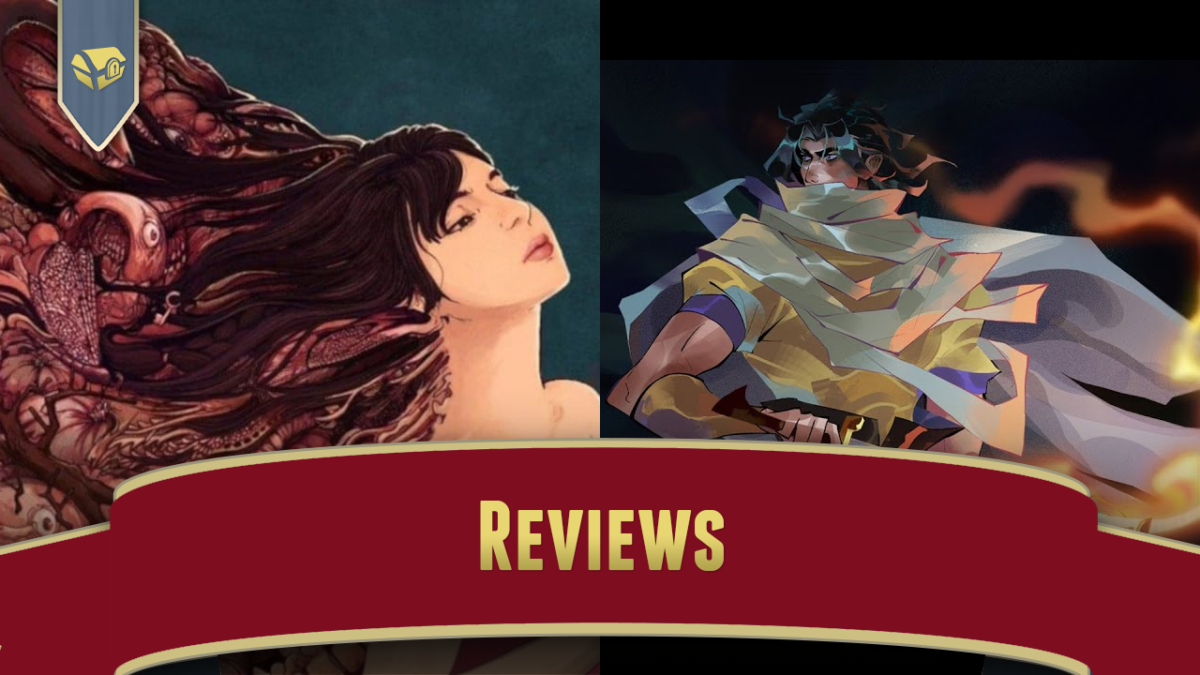Not to keep banging the drum about the new Mario game, but there are a number of what we might call “music levels” in the game, and a couple in particular fit in with the spirit of the day. Here they are: Pumpkin Party and A Night At Boo’s Opera (length: 3 minutes). This is an edited-down version of a 28-minute compilation of all of the game’s music sequences, on Youtube.
Month: October 2023
New Super Mario Bros. Wii’s Exception Handler Code
Codes are largely a forgotten element of video gaming. They started out as debug features that didn’t get removed before release, then they became easter eggs to reveal to favored players, ways to dispense unlockables, ways to provide extra difficulty balancing, and even publicity tools, before the age of DLC gave developers a way to profit off of bonus features. Why have players enter up-up-down-down-left-right-left-right when you could just sell them play advantages outright. I’m simplifying the situation a bit, sure, but I’m not simplifying by much.
Codes still exist, once in a while, but it seems like they’ve gone back to being development aids. One of them crept into New Super Mario Bros. Wii, but only becomes usable if the game crashes. The code is: Home, Minus, Plus, Minus, Plus, 1, 2, 1, 2, A. It brings up a scrollable register dump and stack trace, and other assorted information. It doesn’t let you continue playing. For players, it’s just a curiosity, but it’s a thing that is interesting.
This video shows it off:
New Super Mario Bros. Wii Exception Handler (Youtube, two minutes)
Sundry Sunday: Wolf Reacts to Team Star Fox’s Halloween Costumes
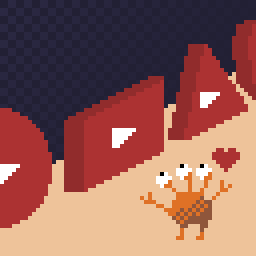
Sundry Sunday is our weekly feature of fun gaming culture finds and videos, from across the years and even decades.
We haven’t covered anything of the exquisitely-made Youtube animation series A Fox In Space yet. Probably someday. But as it was just released and it’s really timely, here is Wolf O’Donnell reacting to Fox and crew’s costumes. CW: bleeped profanity.
Peppy is Beetlejuice? What?
A Fox In Space: Are You Guys Trick or Treating? (Youtube, 36 seconds)
Nintendo vs. Smash Bros. Tournaments
Oh Nintendo. As people following this blog can easily see, we have more than a little fondness for the output resulting from the playing card and igo board maker’s lucrative side venture into video games. Everyone wants to make them like Nintendo, but no one else actually does, or seems to be able to, or can even pin down what that would mean.
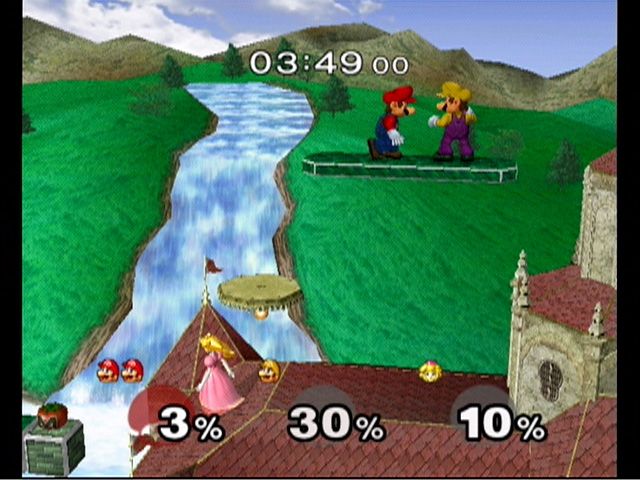
Maybe it’s because, despite being one of the biggest companies in the world, it still feels like a small company, in some ways? Or that they don’t seem as beholden to the bleeding knife of capitalism as other companies are? (This is illusory, of course.) Maybe it’s their adherence to Japanese corporate traditions, or the influence of Shigeru Miyamoto, or their toymaker’s vibe?
But there is a dark side to them as well: they can be incredibly controlling regarding their IPs. Years ago they reached out to a fan
They have what they would call a staunch anti-piracy stance, which you’d expect of most software companies sure, but what that ends up meaning, due to the fact that 99% of their software is made for closed systems like consoles and mobile (we haven’t forgotten about the Animal Crossing PC clock!), they have absolutely no modding support.
This has resulted in a zero-tolerance policy regarding infractions concerning the competitive Smash Bros. scene. Project M is a popular fan-made hack of Super Smash Bros. Melee that it feels like even mentioning will cause Nintendo to affix a red letter to your organization.

Kotaku has reported that there is currently another round of fan backlash over Nintendo’s guidelines over the use of Smash Bros. games in community tournaments. There is good reason: the rules read like they were written by people ignorant of the extent of competitive Smash play.
Nintendo is also demanding tournament prices not rise above $5,000, and is disallowing sponsorships. While it’s true that Nintendo is justifiably a bit cautious about the edginess surrounding esports tournaments, which resulted in sexual misconduct allegations back in 2020, there is definitely a middle ground between preventing situations like that and hamstringing a burgeoning esport, and Nintendo should pursue it, or risk destroying this entire scene.
As I said, I am not a lawyer. Someone who is, is Moonie, who used his incredibly ZeFrank-sounding voice to made a Youtube video breaking down Nintendo’s new guidelines. He doesn’t seem as worried about them as others (the thumbnail to his video is a giant DON’T PANIC). Here is his 18-minute dive into the guidelines, but a major point is that they primarily affect unaffiliated community tournaments, which as a class are distinct from majors, which would have an explicit agreement with Nintendo that would make the limitations in these guidelines not apply. In order words, while some of the furor is justified (other companies like Capcom aren’t as limiting of community events), a lot of it is the result of failed Nintendo messaging. Nintendo does have a lot of trouble communicating things like this that won’t get everyone’s roar up.
But even with that proviso, it’s still not great? Nintendo is still claiming that fan modifications are entirely forbidden, even among community tournaments.
What do I think? Nintendo could fix all of this by changing their EULA by explicitly recognizing and allowing for fan work, but in a way that asserts the primacy of their IP. Again, IANAL, but if they put their own lawyers to work to try to forge a system whereby fans could continue to build off of their work, they might be able to do it in such a way that they don’t risk damaging their properties. Other companies have done it, notably Sega, who blessed fangame creators in a way that generated their megahit Sonic Mania. What is causing Nintendo’s overreaction here, in my onion*, is their institutional distaste for even acknowledging that people are hacking their systems and modifying their games in the first place.
* typo made on purpose
I must acknowledge, there would be a whole flowchart of knock-on effects if Nintendo were to acknowledge and accept fan modifications, and probably not all of them would be to Nintendo’s benefit. Particularly, just to modify their software requires breaking their system security, which doesn’t necessarily imply piracy but does mean opening up the system sandbox and maybe revealing system secrets like keys. Sega doesn’t make consoles any more, so it’s not an issue they have to worry about now.
But what is obvious is that they’ve frequently attacked a vibrant community, and making a lot of enemies out of players. There has to be a good solution to this.
Super Smash Bros. Fans Freak Out About New Nintendo Rules (Kotaku)
A Lawyer Analyzes Nintendo’s Tournament Guidelines (Moon Channel on Youtube, 18 minutes)
Candy Box 2
As foretold yesterday, today’s post is on the sequel to Candy Box, Candy Box 2.
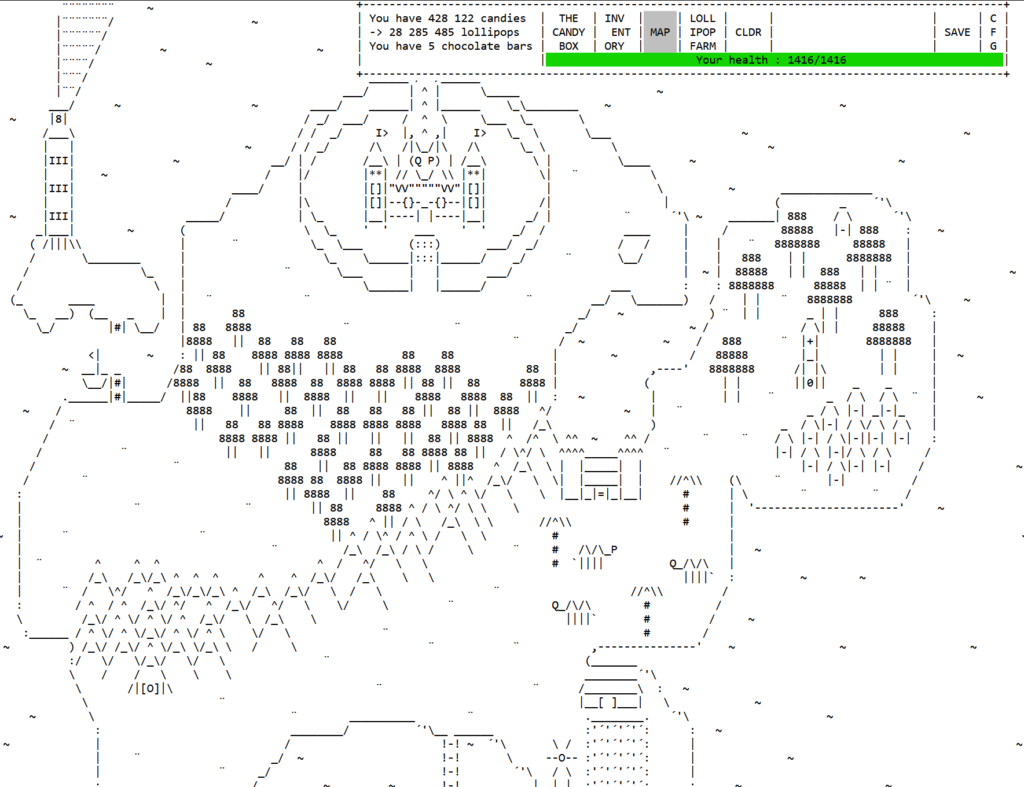
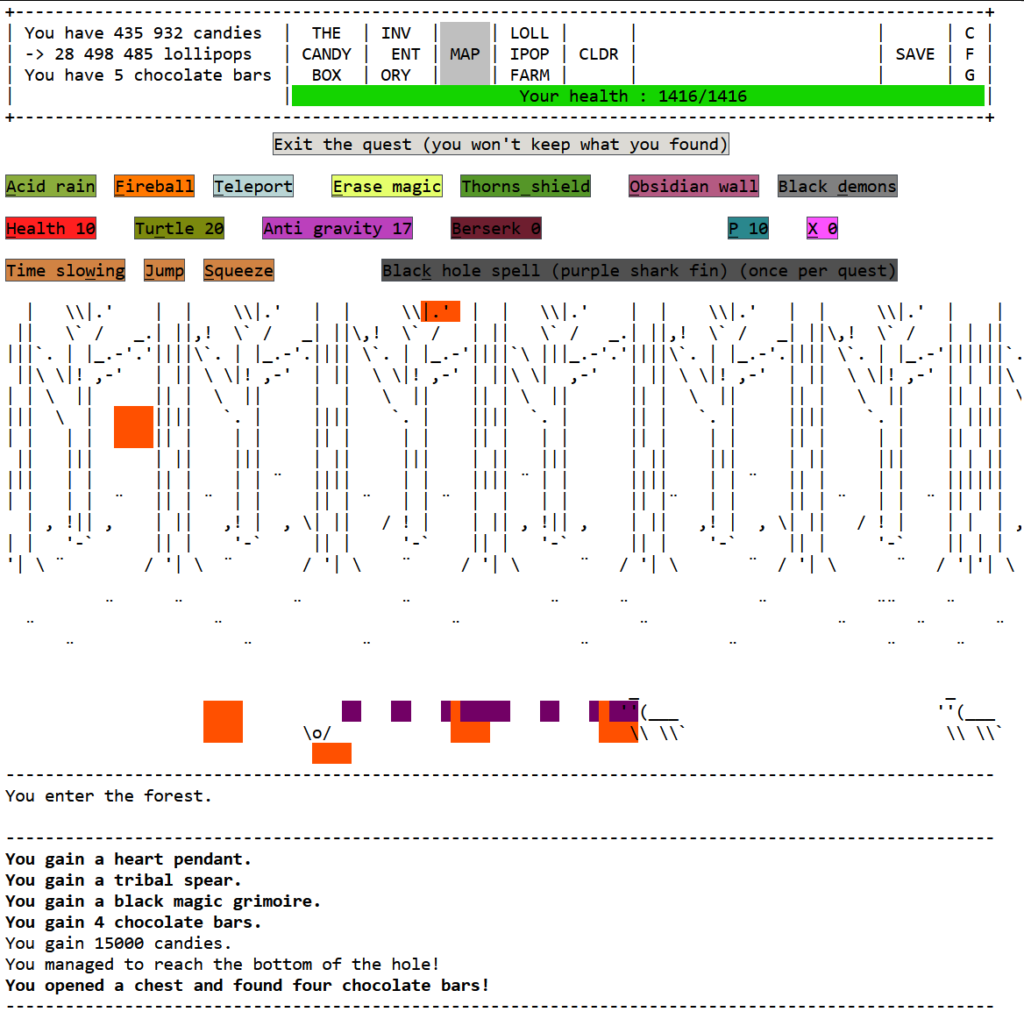
It’s a much more developed game, with rather a lot of depth to it, but it’s still ultimately an incremental-style game in form, even if its not as direct about it as most of that benighted genre tend to be. There’s many more places to go and items to find than the first game, and a lot more secrets. If you don’t use the wiki, you’ll probably get stuck and have to search around for a few days until you find (or save up) the means to continue.
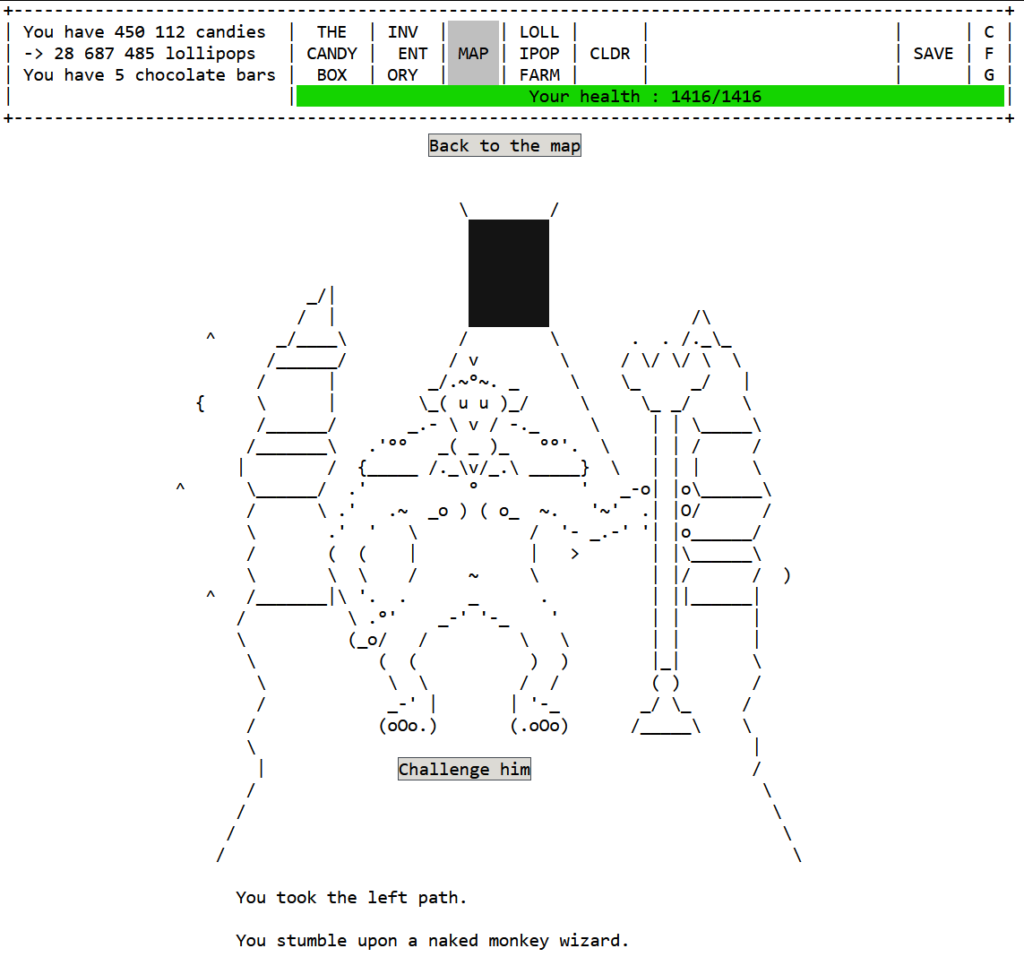
While figuring out all the various ways to overcome the game’s puzzles is fun, I find the most interesting thing about Candy Box 2 to be its engine, which is surprisingly flexible for a game presented entirely with text characters, which is kind of like a deluxe Javascript version of the venerable Unix library curses. There’s windowing, a Z-order so objects can pass in front of others, and colors are used for magic effects, and some areas even have special effects, like scrolling around, zooming in on the action, or being able to swim up and down.
The highlight in this one is the puzzle the Cyclops at the lighthouse can eventually be persuaded to let you try, which as far as I can tell is of a completely novel type, and could be the subject of its own entire game. Good luck with that, by the way.
Like the first game, there was a preposterous Metafilter thread about Candy Box 2, and it’s even more full of spoilers, and equally as bizarre if taken out of context. Please enjoy responsibly.
Candy Box 2’s New Home (github.io)
Candy Box
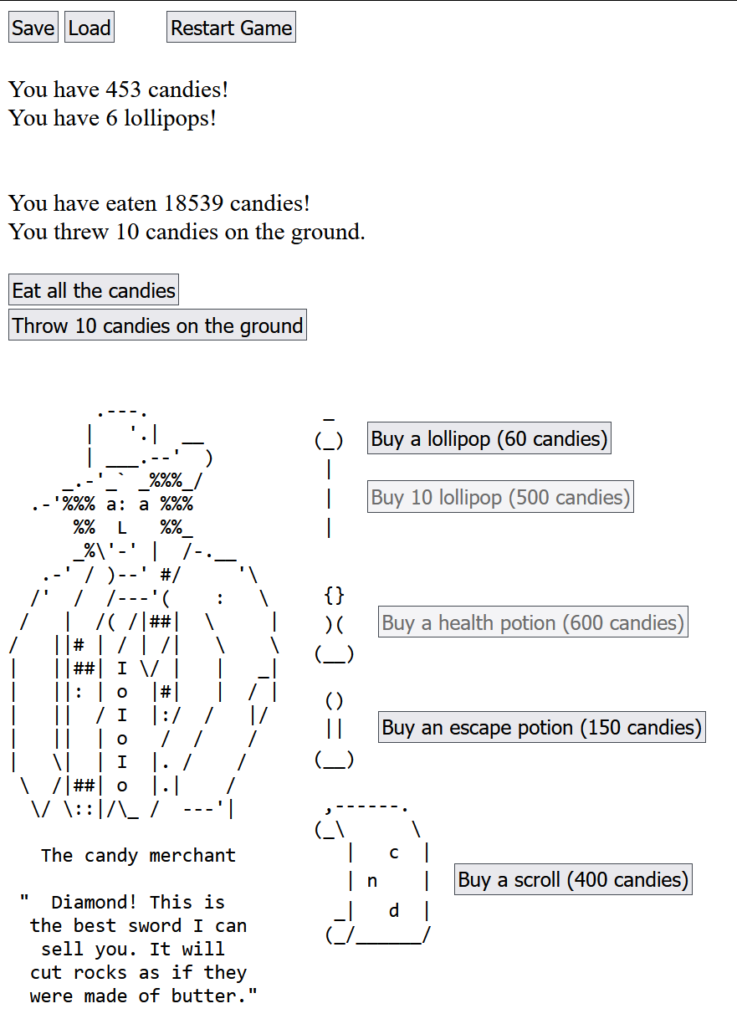
Candy Box is pretty ancient now, over ten years old. Here is the Metafilter post where we discussed it, which reads like the rantings of crazy people but is also full of spoilers. It was an early entry in the genre of incremental games, sometimes called “clickers,” like Cookie Clicker and Clicker Heroes, and may well have inspired some of them. It’s still online (at a new home), and its still just as playable as it always was, its extremely ASCII presentation now even more appealing now than it was back in 2013.
While it may have helped kicked off the genre, I feel it’s important to point out that there’s actually a lot more going on here than Number Go Up. You go on quests! You have equipment! You have an alternate currency to track, lollipops, with different production characteristics!
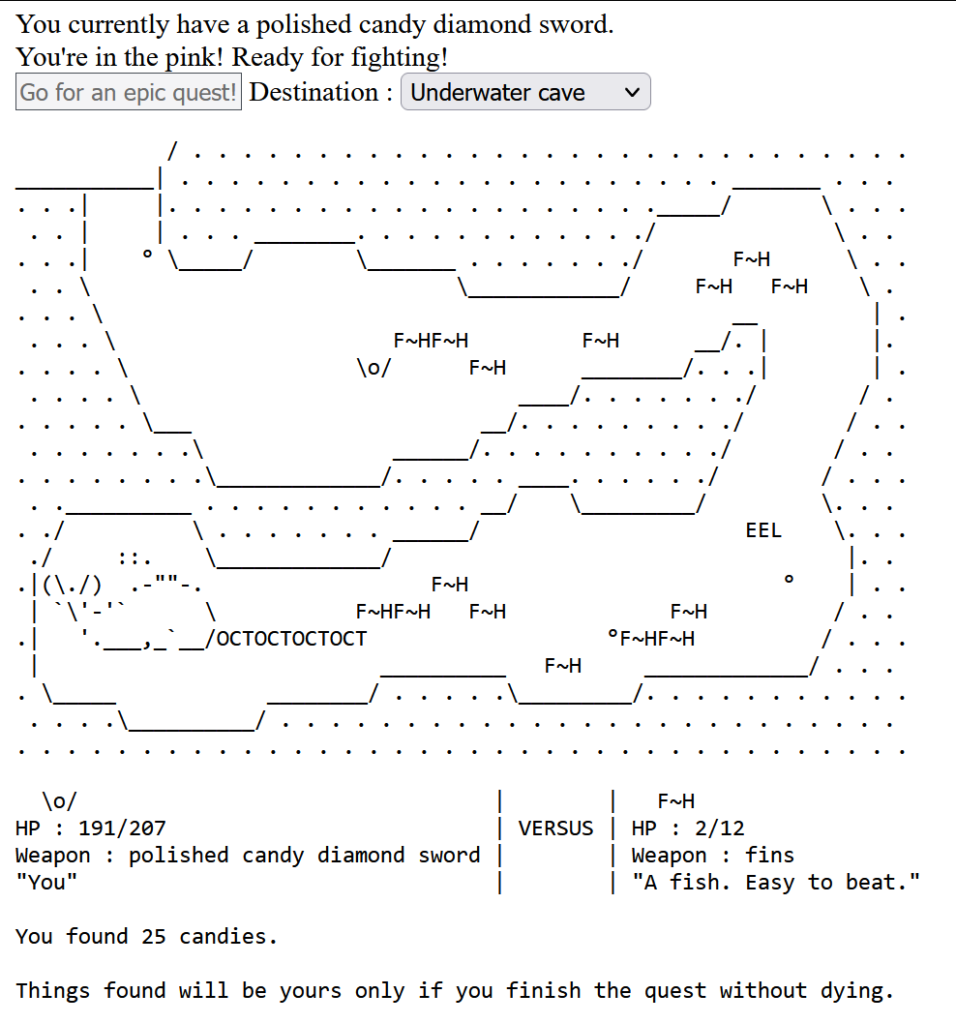
Candy Box is a game that’s best experienced going in cold, but since its gleeful hugeness is less of a hilarious shock now that countless other games have done it too, it might help a bit to give you some starting advice. Eating candy isn’t useless: it increases your maximum HP.
Every time you reach what you think is the pinnacle of ridiculousness, some new aspect is introduced. By the end you’ll be mixing up candy potions, using a a candy alchemy system much more detailed than most AAA game’s crafting systems, using only two ingredients.
There’s a sequel too, but let’s save that for tomorrow….

Candy Box’s New Home (github.io)
Double Reviews of Decarnation and Nocturnal
This is a double indie game review of Decarnation and Nocturnal, both played with press keys provided by the developer.
0:00 Intro
00:14 Decarnation
4:05 Nocturnal
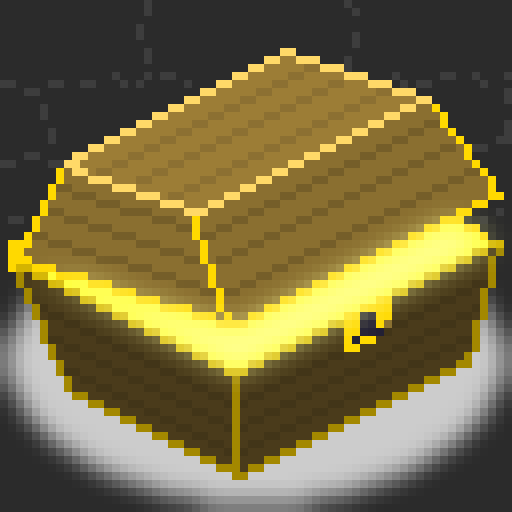
Owner of Game Wisdom with more than a decade of experience writing and talking about game design and the industry. I’m also the author of the “Game Design Deep Dive” series and “20 Essential Games to Study”
Sudo Sweep
It’s not a command to delete temp files as root on a Unix-styled system! It’s a fun and free little game over at itch.io!
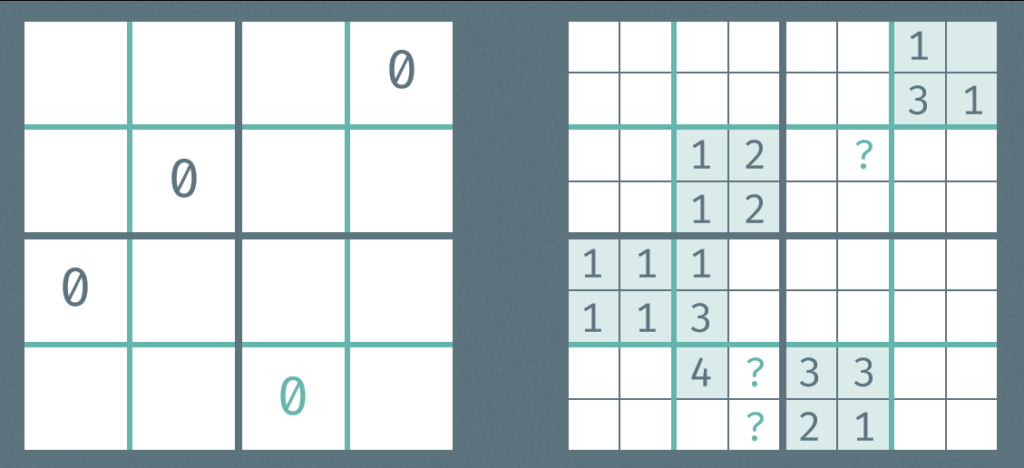
The board on the left is a Sudoku-like game; the board on the right is Minesweeper. The two boards match: the numbers on the Sudoku board are the number of mines in the matching area of the Minesweeper game. You use each to help you solve the other!
It’s not perfect, mind you. There’s currently no way to mark a square that definitely has a mine in it, just the question marks you see in the right-hand board above. There are still cases, familiar to players of standard Minesweeper, where you end up having to guess. And don’t click the “change size” button if you care about the current game: it doesn’t make the boards larger, it starts a new game with bigger Minesweeper and Sudoku boards!
Still though, I have to give creator Rianna Suen props for a cool idea! I found this through the “map obelisk” area during Roguelike Celebration, which is a pretty cool place to find things beloved of clever people!
Sudo Sweep (itch.io, free, playable by web)
Advance Wars By Web
Advance Wars By Web is a long-standing website allowing for Advance Wars games to take place between players online. It’s old enough that it came out before Advance Wars Dual Strike, the first DS Advance Wars game, and has survived long enough to see the release of Dual Strike, Advance Wars Days of Ruin, and now Advance Wars 1+2: Reboot Camp.

The first Advance Wars game had a legendary awkward launch date: September 10, 2001. I don’t know if world events following it had any influence on its popularity, but Advance Wars had the advantage of being a long-running series, going back to the Famicom, that had never been given a chance in Western territories. (One reason? Super Famicom Wars had a notorious character named Hister, with a moustache that made its inspiration unmistakable.)
The first two Advance Wars titles, taking their name, like previous versions, from its release platform the Gameboy Advance, were unexpectedly popular. The gaming groups I was in in college played an incredible amount of Advance Wars 2. We maxed out the game’s timer at 999 hours! I have no doubt that, if our group hadn’t broken up from people graduating and leaving, we’d still be playing it today.
Both of these games are preserved in proper fashion by Wayforward’s Switch remake of Advance Wars and its immediate sequel. Of the two games after it, Dual Strike leans a bit too hard on CO powers (already a creeping problem in AW2), and Days of Ruin implemented a lot of gameplay adjustments and fixed but, alas, lost the weird sense of fun from the semi-cartoony characters and setting of the first two games.
The Gameboy Advance Advance Wars games did not have internet-enabled multiplayer. The DS versions had better options, but they’re unavailable now, at least without some technical effort, due to the shutdown of the Nintendo Wi-Fi Connection.
Advance Wars By Web both allows a game much like AW2 to be played over the internet, and it does so with features that make it feel like a play-by-mail game, with the site handling the state involved with turn-based multiplayer. It does this at the of having any form of single-player: all of its battles are against other human players. So it’s not an excellent way to learn to play Advance Wars games interactively, as with the official games, which easy you into the game a bit at a time. But as for learning how to play this online version, there’s a number of useful videos available on their Tutorials Page. I especially like their video on overcoming first turn advantage, which they do by spotting the second player one Infantry unit. It’s not a perfect solution, but one that works out fairly well in play. And the video on designing balanced multiplayer maps, which offers a lot of practical advice that can be carried over into designing maps for the original games. And there’s a huge library of over 3,800 games to view, if you want to see how the community plays.
I don’t know if Reboot Camp is helping to sustain the avid fandom that the first Advance Wars games did, but I’ve enjoyed it a lot. If you enjoy it too, you can go from Reboot Camp right into playing against people online on AWBW. I can’t offer much more about it than that, for Advance Wars is a deceptively deep game and I have to make a post here, on the average, every day, but it’s been offering online play between humans for nearly twenty years now! That has to count for something.
Advance Wars By Web (awbw.amarriner.com)
Sundry Sunday: Eggpo, Waiting

Sundry Sunday is our weekly feature of fun gaming culture finds and videos, from across the years and even decades.
It’s been a while since we checked in with Eggpo, from “Two More Eggs,” that series the Brothers Chaps (creators of Homestar Runner) made for Disney XD or sommin like that. In case you forgot, Eggpo is the species of these eggplant people, whose job it is to attack the “good guy,” a.k.a. Dooble, who features in other TME videos.
Here, two Eggpos engage in the basic repetitive patterns entailed by their employment, without much success.
Eggpo: Waiting (Youtube, one minute)
SpriteCell’s JRPG Magazine Review Archive
This is quite a collection to look through! While it was originally posted in 2021, it was updated with some new reviews just this past Sunday. They’re sorted alphabetically by game. They go at least as far back as NES Dragon Warrior, but some of them are really recent, especially with the addition of games reviewed by WalMart’s free pass-out magazine GameCenter. Their definition of JRPG kind of goes far afield, with some metroidvania-style Castlevanias, two Advance Wars games and a good number of half-related things.
Here are a small selection of included magazine scans….
GamePro’s review of the TurboGrafx port of Cadash, which unlike the Genesis/MegaDrive’s version has all four characters from the arcade game. The review’s written by “The Pizza Boys,” and has slangy writing and goofy little cartoon faces over the review scores, because it’s in a magazine written for teenage boys from 1991. Notice, the whole review is seven paragraphs, with four section headings, and four “PROTIP” inserts that don’t offer useful advice:
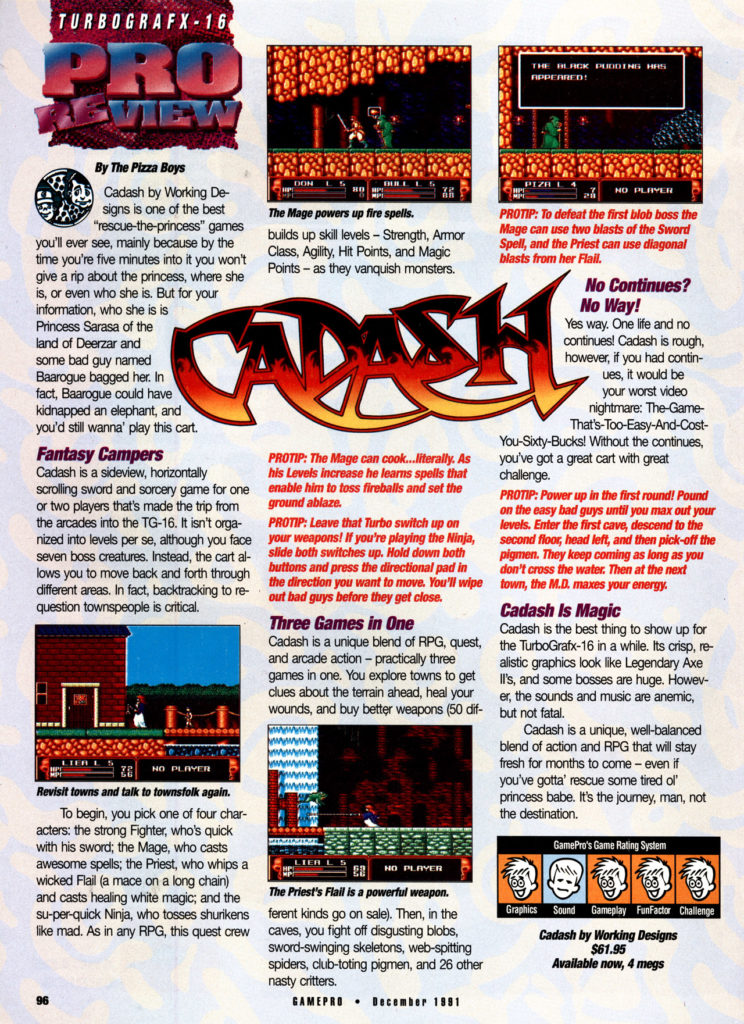
The review of Dragon Warrior from Game Player’s. I love it when magazines from this era publish the address of Nintendo of America. This review doesn’t really tell you much about the game though:
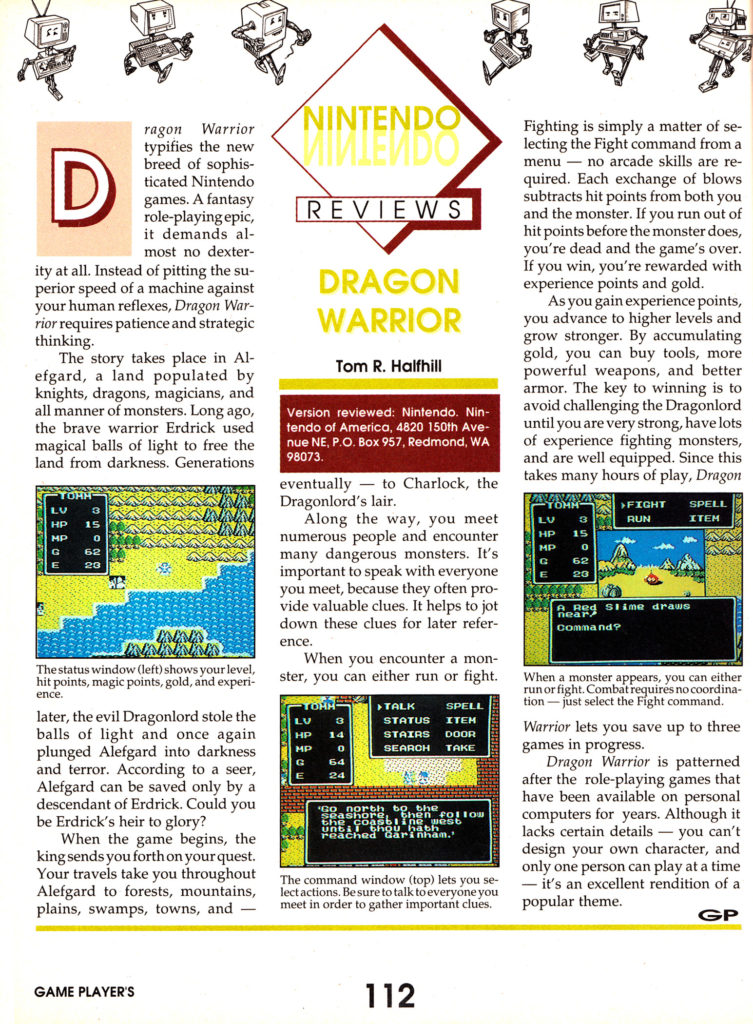
I had forgotten about this phase in Nintendo Power’s history. Check out their dissing the inventory of Earthbound, Nintendo’s own product! (I disagree, BTW, Earthbound is designed around its inventory limits, and they’re an essential part of the game!)
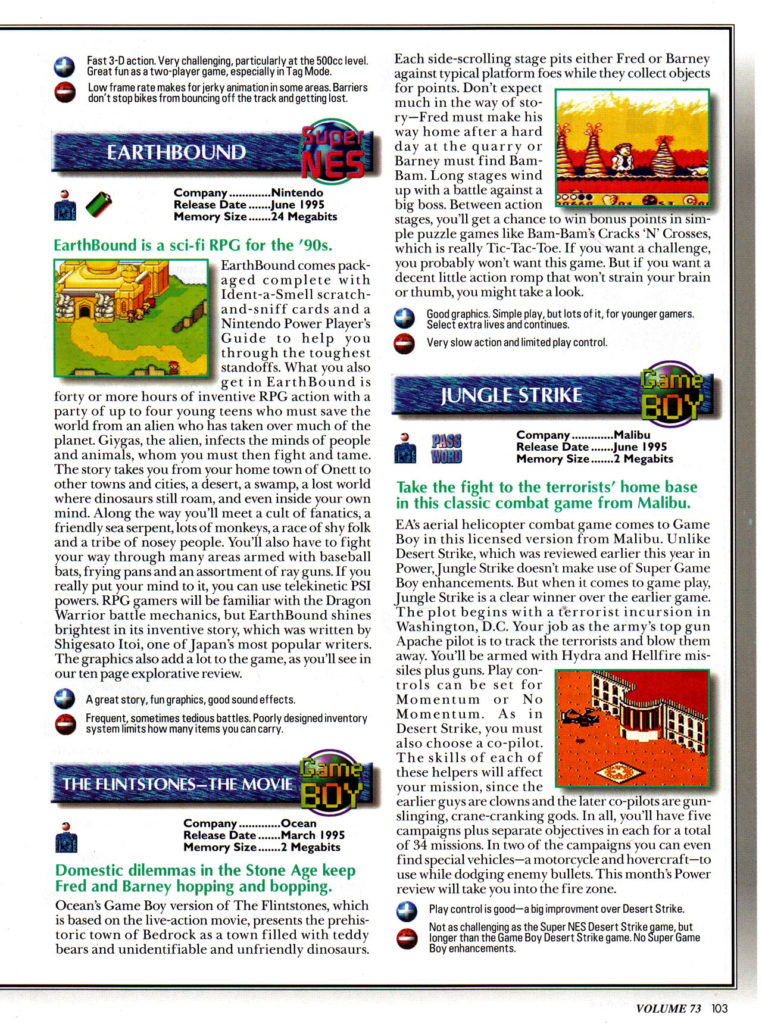
VideoGames & Computer Entertainment has always had a place in my heart, and Clayton Walnum is one of my favorite reviewers. In its heyday it had a no-nonsense approach to their reviews that appealed to me. It was the exact opposite of Electronic Gaming Monthly, a magazine that, honestly, I never much liked because of their loud editorial style and tendency to bloat their magazine up with advertisements:
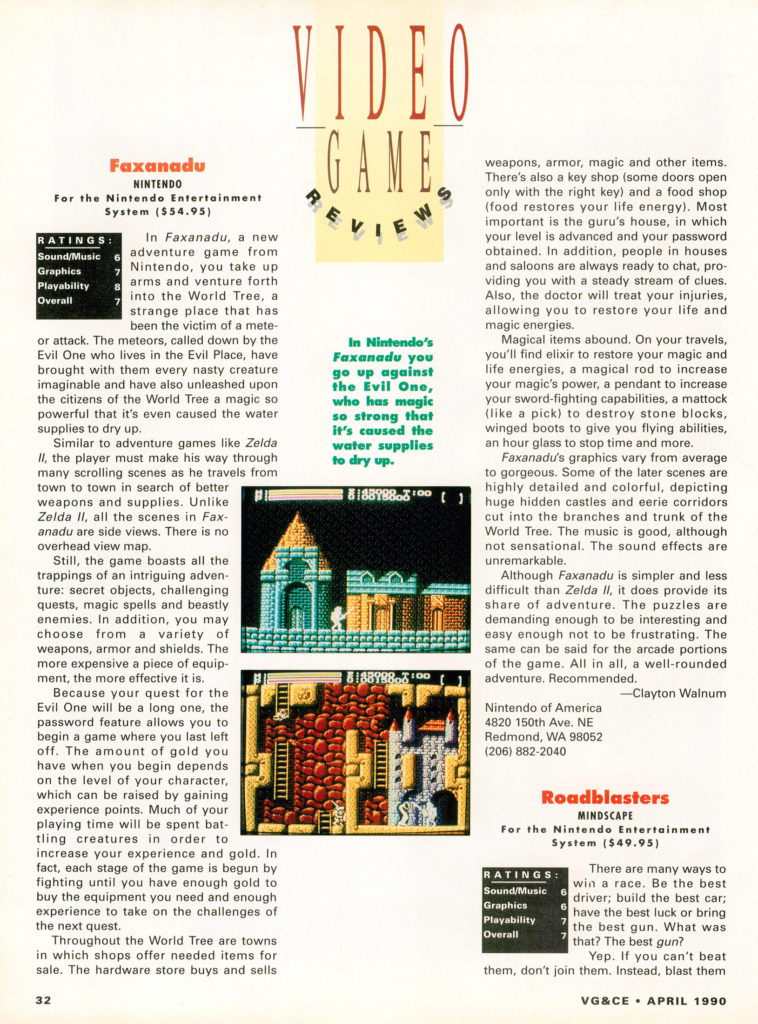
Who doesn’t love Grandia? This review reminds us that we almost didn’t get an English version of it!
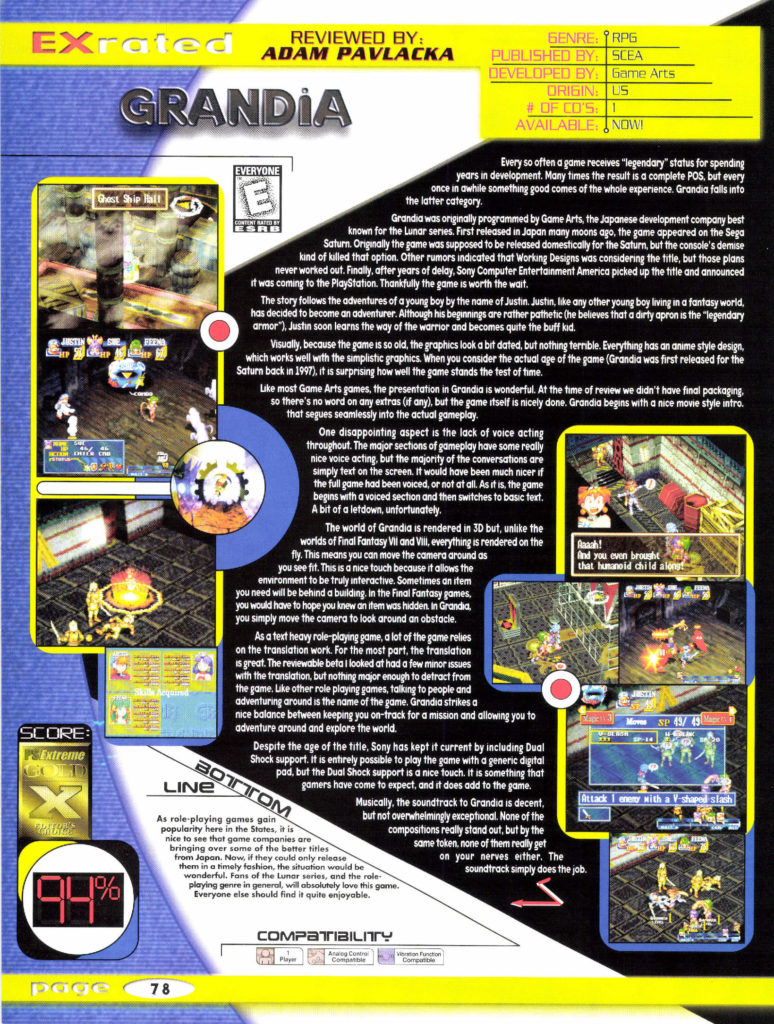
Little King Story is, no lie, one of the most overlooked Wii games of all time:
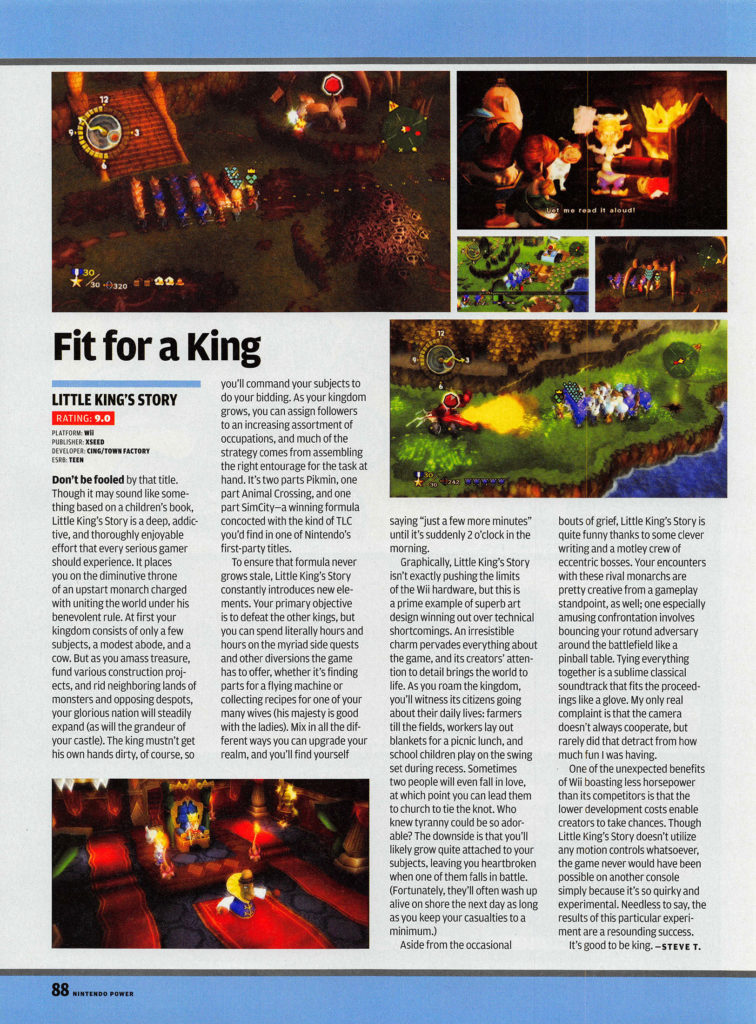
“VideoGames: The Ultimate Video Game Magazine” had a redundant title, but some fun layouts. Here’s their two page review of SNES Ogre Battle:
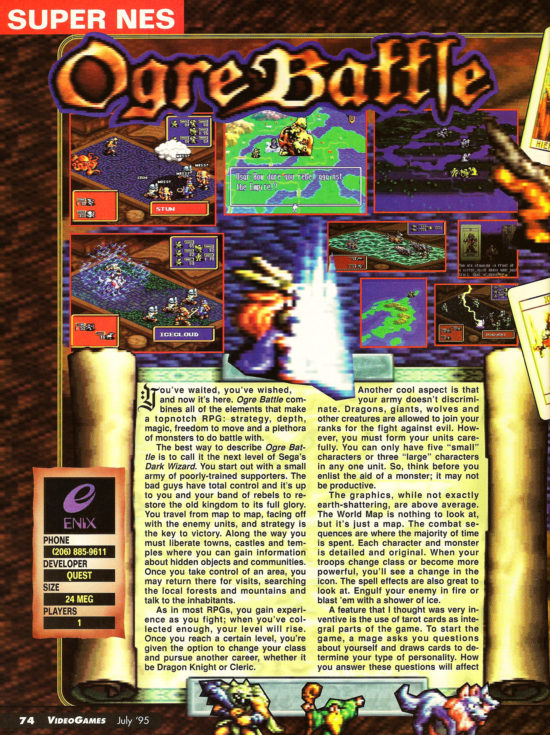
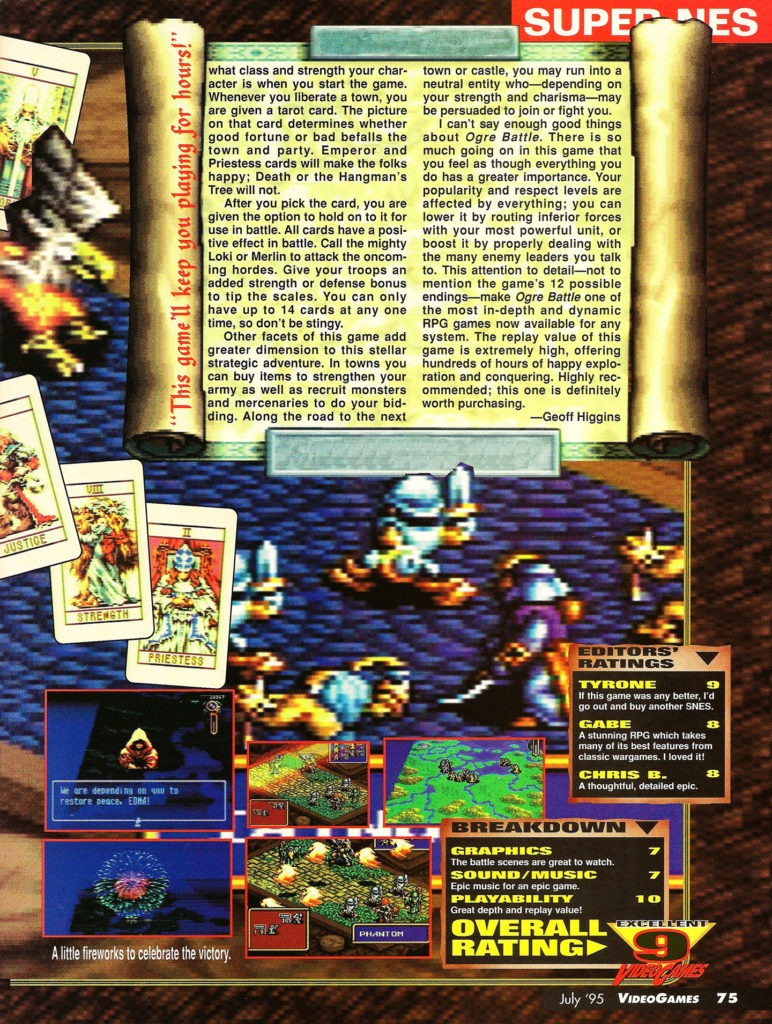
Sega Visions’ review of Phantasy Star II, a very grindy game without much story really, but with some really great twists:
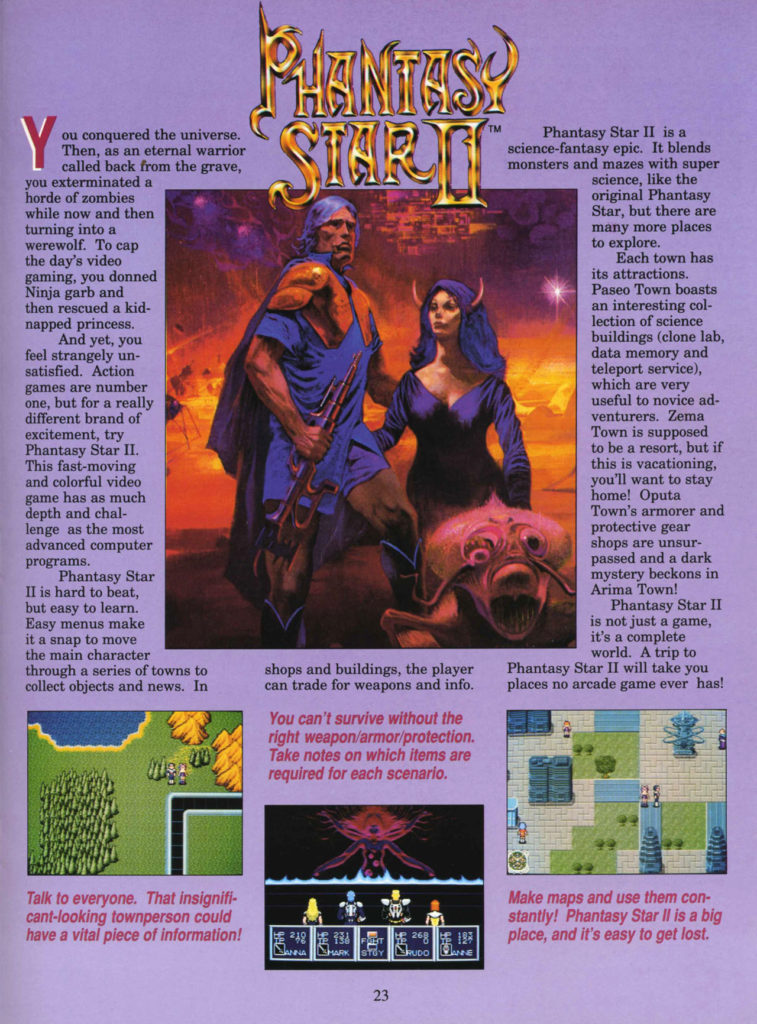
EGM’s review of the remake of Shining Force for GBA:
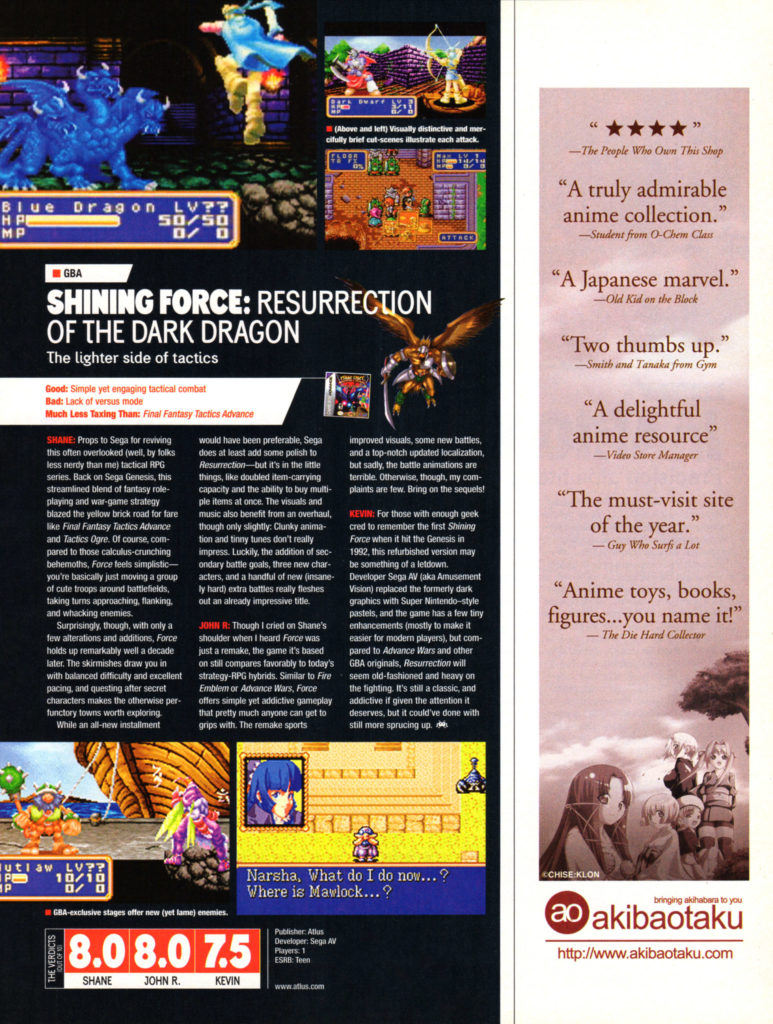
GamePro’s review of Suikoden II didn’t age real well:
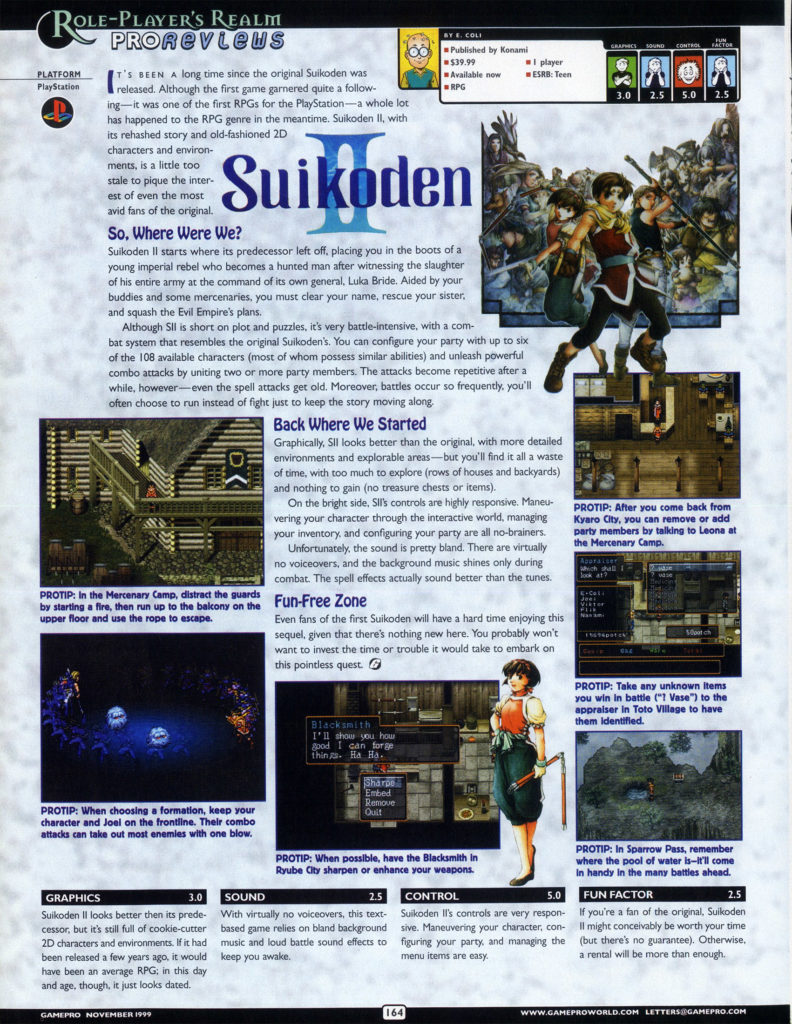
Vay, here mostly to show off the anime character portraits:
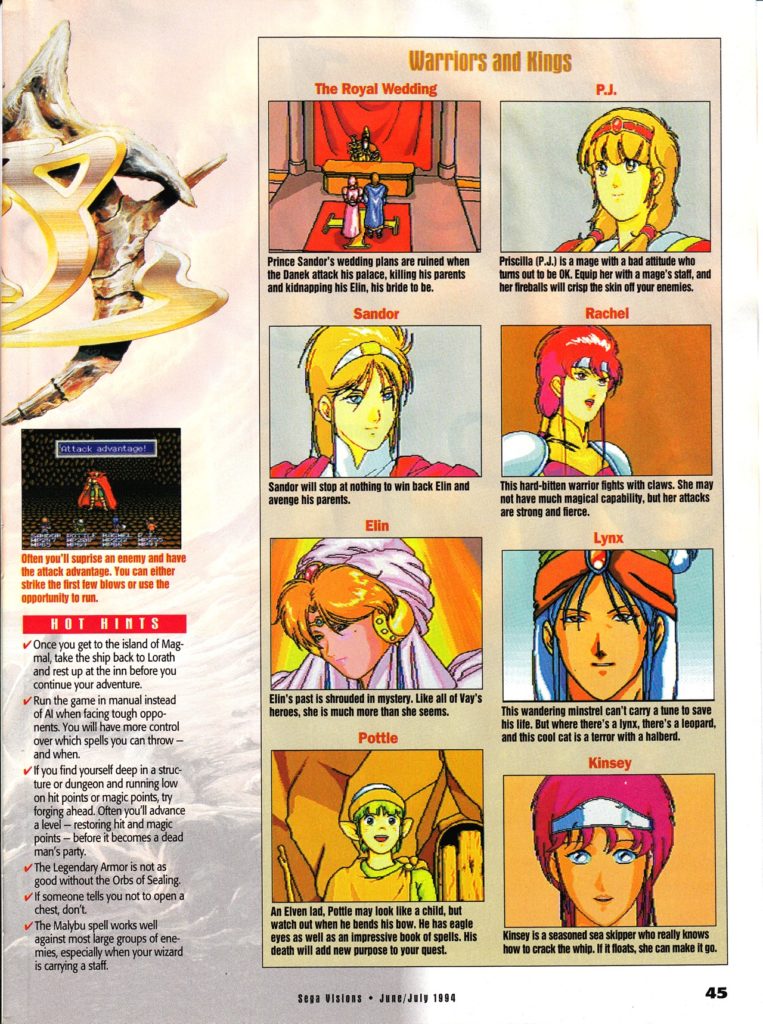
Zelda II in a late review from The Nintendo Official Magazine, with Dr. Mario riding along:
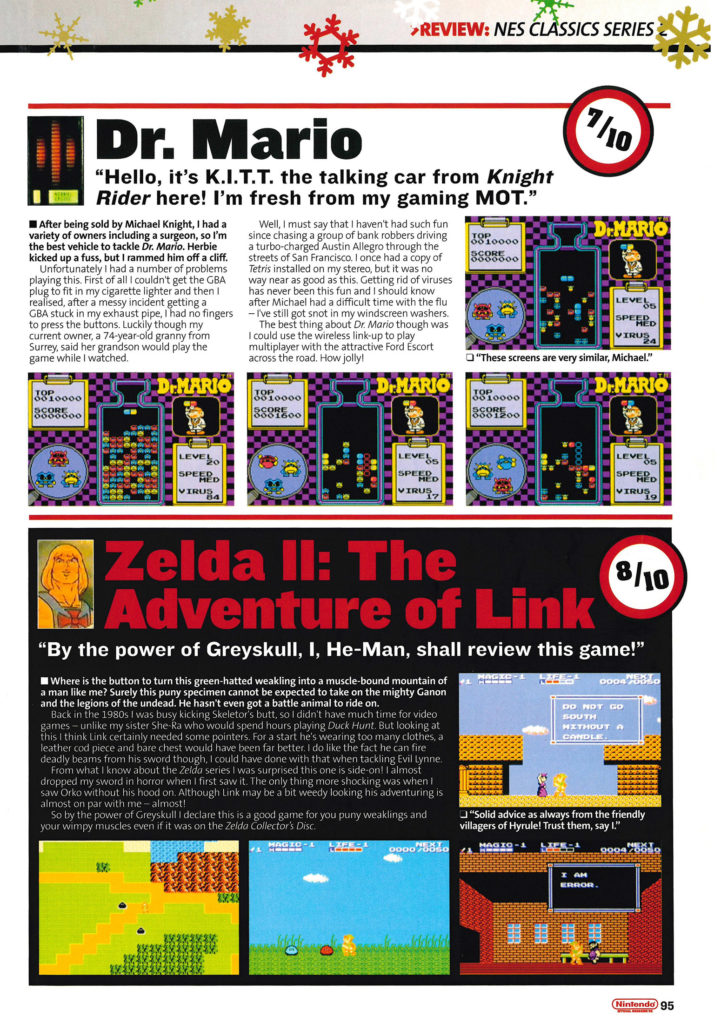
The JRPG Review Archive (spritecell.com)
Roguelike Celebration Talks Start Tomorrow!

Ah, it crept up on me, so let me remind everyone that Roguelike Celebration begins today, although until tomorrow it just means they’re opening their social space for awhile. Nicole Carpenter at Polygon wrote a short piece about this year’s conference.
There is an admittance fee, but if you can’t afford it you can also get a free pass! Please consider paying them if you are able though, they do a lot of work every year in putting it together.
Here is the official schedule (linked), below is it presented just as a list of talks, with ✨sparkle emojis✨ around the things that personally enthuse me. ✨Just because!✨
Times given are US Pacific/Eastern. If you think the short times between starts are indicative of short talks, most of them aren’t that short, they have two tracks going on beside each other:
SATURDAY
9:30 AM/12:30 PM: Arron A. Reed, Klingons, Hobbits, and the Oregon Trail: Procedural Generation in ✨the First Decade of Text Games✨
10:00 AM/ 1 PM: Nic Tringali, ✨Abstract Space Exploration✨ in The Banished Vault
10:30 AM/ 1:30 PM: Linas Gabrielaitis, Fictions of Infinity in ✨Geological Finitudes✨
10:45 AM/1:45 PM: Ludipe, Exploring ✨Pacifist✨ Roguelikes
11:30 AM/2:30 PM: Florence Smith Nicholls, Another Stupid Date: ✨Love Island as a Roguelike✨
11:45 AM/2:45 PM Kes, Hunting the Asphynx: Roguelikes, ✨Provenance✨, and You
Noon/3 PM: Mike Cook, Generating Procedures: ✨Rule and System Generation✨ for Roguelikes
1:30 PM/4:30 PM: Scott Burger, The ✨Data Science✨ of Roguelikes
2 PM/5 PM: Nat Alison, In Defense of ✨Hand-Crafted Sudoku✨
3 PM/6 PM: Eric Billingsley, Scoped-down design: ✨Making a Tiny Roguelike✨
3:30 PM/6:30 PM: Elliot Trinidad, Touching Grass & Taking Names: Tuning the ✨Blaseball✨ Name Generator
4:30 PM/7:30 PM: Paul Hembree, Audible Geometry: Coordinate Systems as a Resource for ✨Music Generation✨
5 PM/8 PM: Jurie Horneman, Why ✨Dynamic Content Selection✨ Is Hard
SUNDAY
9:30 AM/12:30 PM: Mark Johnson, ✨Generating Riddles✨ for a Generated World
10 AM/1 PM: Jesse Collet & Keni, Fireside Chat About the Development of ✨NetHack✨
10:30 AM/1:30 PM: ✨Leigh Alexander✨, ✨McMansions of Hell✨: Roguelikes and Reality TV
1 PM/4 PM: Ray, Remixing the Layer Cake: Facilitating ✨Fan Reinterpretation✨ Through ✨Caves of Qud✨’s Modular Data Files
1:15 PM/4:15 PM: Crashtroid, Preventing Ear Fatigue with ✨Roguelike Music✨
1:30 PM/4:30 PM: Everest Pipkin, The Fortunate Isles: Fragment Worlds, Walled Gardens, and ✨the Games That Are Played There✨
2 PM/5 PM: ✨Jeff Olson✨, ✨Alphaman✨: Developing and Releasing a Post-Apocalyptic Roguelike Game in the ✨DOS Days✨ When Computers Were Slow, Memory Was Scarce, and No One Had Ever Heard of Object-Oriented Code
3 PM/6 PM: Dustin Freeman, ✨Live Action Roguelike✨
3:30 PM/6:30 PM: Jonathan Lessard, A ✨Simulation✨ with a View
3:45 PM/6:45 PM: Tom Francis, Generating ✨Boring Levels✨ for Fresh Experiences in Heat Signature
4 PM/7 PM: Patrick Kemp, Design Tooling at ✨Spry Fox✨
5 PM/8 PM: Stav Hinenzon, A Messy Approach to ✨Dynamic Narrative✨ in Sunshine Shuffle
5:15 PM/8:15 PM: Josh Galecki, ✨Procedurally Generating Puzzles✨
5:30 PM/8:30 PM: Jasper Cole, ✨Backpack Hero✨ – Player Upgrades and Progression
6 PM/9 PM: Brianna McHorse & Chris Foster, Fusing AI with Game Design: Let the ✨Chaos✨ In

